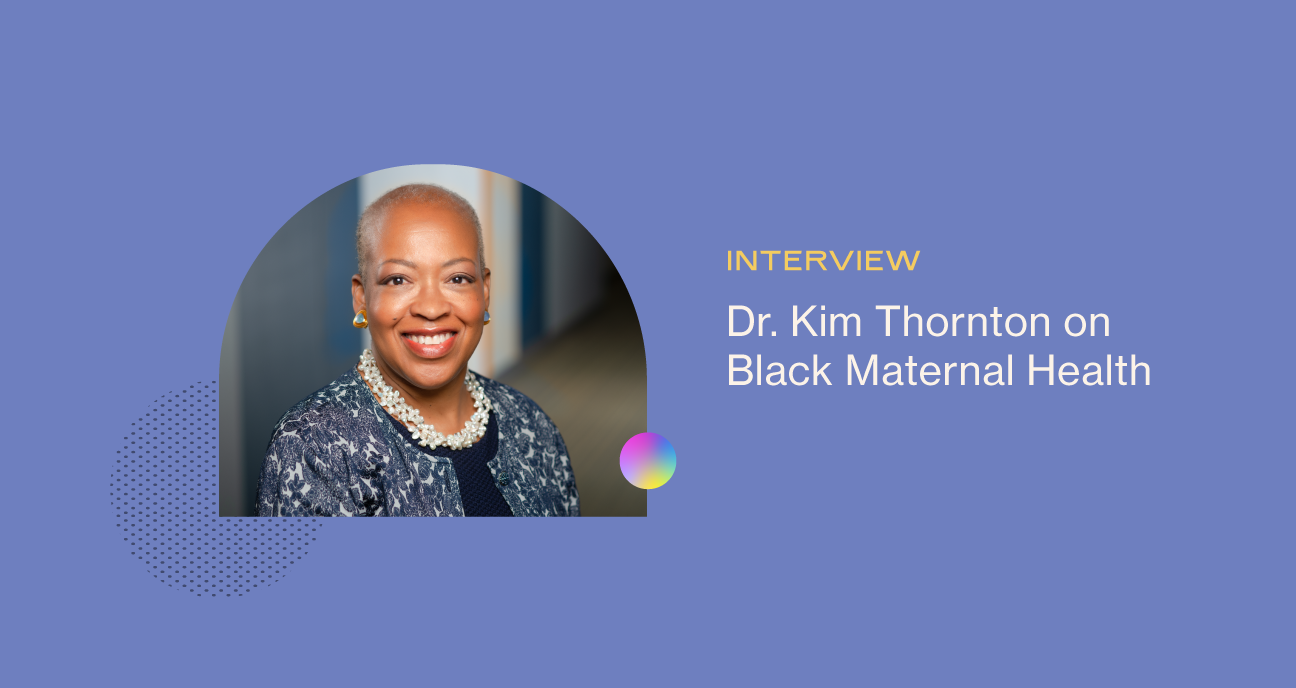Our Conversation with Dr. Kim Thornton on Black Maternal Health

As we recognize Black Maternal Health Week 2023, we reflect deeply on the challenges facing Black patients on their road to parenthood. A public health campaign founded by the Black Mamas Matter Alliance six years ago and recognized by President Biden in 2022, Black Maternal Health Week aims to amplify Black perspectives on the maternity experience, build community, and bring awareness to the critical need for improved outcomes and care for Black people who give birth.
Recently, we were fortunate to speak with Alife clinical advisor, Kim Thornton, MD, about the challenges Black patients face as they experience and seek help for infertility. Dr. Thornton has extensive and in-depth experience with infertility care through her work as a board-certified Reproductive Endocrinologist at Boston IVF and an Assistant Professor at Harvard Medical School, in addition to her appointment to the American Society for Reproductive Medicine Diversity, Equality and Inclusion Task Force.
Read on for our interview with Dr. Thornton!
ALIFE: What are some of the challenges that Black patients in particular face when they seek treatment for infertility?
DR. THORNTON: The challenges are numerous. They include:
-
Disparities in Access to Care: Black women are reported to be less likely to receive fertility testing and fertility treatment. Even in states that have a fertility mandate, such as Massachusetts, there is not an improvement in access to care among minority patients.
-
Family Planning: Black women are less likely to know about effective contraceptive methods and that there are reversible methods of contraception that are about as effective as tubal sterilization. In fact, Black women have been found to have higher rates of tubal ligation at the time of Cesarean section as compared to white women.
-
Fertility Preservation: When Black women need gonadotoxic therapy – such as chemotherapy, radiation, or surgery that will affect their reproductive organs – they are often not referred for fertility preservation services beforehand.
-
Worse Outcomes from Ectopic Pregnancy: Despite an increase in Methotrexate use and a decrease in surgical management, Black women are 34% less likely to receive medical management for ectopic pregnancy and are 34% less likely to receive conservative tubal surgery.
-
Greater Chance of Infertility: When Black women experience infertility, they are two and a half times more likely to have tubal factor infertility due to prior tubal ligation or hydrosalpinx (when fluid blocks the fallopian tubes). Black women are also three times more likely to have a uterine factor (fibroids) affecting their fertility as compared to white women.
-
Diminished Ovarian Reserve: Among Black women who undergo IVF, a greater proportion will have diminished ovarian reserve. This may be because they seek fertility care later in life, either because of a late referral from a provider or due to a perceived stigma regarding infertility in general delaying their provider if they have fertility concerns.
-
Lower Live Birth Rates: Black women have lower live birth rates compared to white women even after adjusting for many confounding factors. That they experience higher rates of uterine factor (fibroids) and tubal factor infertility may explain some but not all of these differences. Additionally, differences in BMI may affect outcomes, though even after adjusting for confounders within each BMI category, differences still persist.
ALIFE: What can clinics and clinicians do to improve Black patients’ outcomes as they seek treatment?
DR. THORNTON: To start, clinics can improve reporting of race so that better race specific outcome data is available. They can also encourage the participation of minority patients in prospective trials.
By improving provider education for general OB-GYN and primary care providers, patients’ risk factors can be recognized and managed so patients are referred for fertility treatment earlier. This includes addressing the medical conditions that negatively impact black women’s fertility journey sooner as part of their routine health maintenance, including obesity, tubal disease, fibroids, and advanced maternal age.
Clinicians can also educate patients about the causes of infertility, provide information about treatment options, and normalize fertility treatment to reduce the stigma that is often perceived within the minority community.
ALIFE: What can fertility clinics do to improve Black patients’ experience of seeking and receiving care?
DR. THORNTON: It is important that the overall patient experience – from their first website search to the moment they walk into a fertility clinic – makes them comfortable. Ensuring that the website reflects a diverse patient population and that there are diverse providers (physicians, nurses, medical assistants, embryologists, and mental health providers) will help patients feel that the clinic will be culturally sensitive to their needs.
Research shows that when health care providers of color serve patients with the same cultural backgrounds, those patients have better health care experiences and outcomes. However, there are barriers to this experience. According to ACOG in 2017, only 11% of OB-GYNs in the US were African-American. According to ACGME from 2019-2020, 8% of OB-GYN residents and 6.5% of Reproductive Endocrinology and Infertility fellows were African-American. Since race and ethnicity were self-reported by only 131 members out of more than 8,000, according to ASRM 2021, it is challenging for patients to do meaningful research on providers until the information we have about provider race improves.
One of the goals of the ASRM Diversity, Equity and Inclusion committee is not only to understand the current landscape of the reproductive endocrinology providers within our field. Additionally, the committee is working on efforts to ensure that there is an intentional effort made to increase pipeline programs with the goal of increasing diversity in the workplace by increasing the number trainees among all providers of reproductive endocrinology and infertility services (physicians, nurses, mental health providers, and reproductive scientists).
ALIFE: What research is still needed to understand and treat infertility for Black patients?
DR. THORNTON: There are many areas that would benefit from increased research. We need to encourage health disparities research, in general. We need to study the environmental factors that adversely impact fertility in Black patients, such as environmental toxins and endocrine disruptors. We also need to study the impact of fibroids in different locations within the uterus on fertility, differences in hormonal factors that impact fertility, and endometriosis in Black patients and its impact on fertility.
ALIFE: What organizations and support systems exist for Black patients seeking help for infertility?
DR. THORNTON: The ones I’m most familiar with include the Cade Foundation, Sister Girl Foundation, Brown Broken Egg, and Fertility for Colored Girls. There are others as well.
Dr. Kim Thornton is Director of the Division of Reproductive Endocrinology and Infertility at the Beth Israel Deaconess Medical Center and a practicing Reproductive Endocrinologist at Boston IVF for over 30 years. She serves on the American Society of Reproductive Medicine Board of Directors as a Director at large (2021-2024). She has been a member of the ASRM Diversity, Equity, and Inclusion task force (2021) and is currently a member of the ASRM Diversity, Equity and Inclusion committee (2022-2025) where she is leading the subcommittee charged with enhancing opportunities to increase and support diversity and equity, and the inclusion of underrepresented minority populations, in the profession and leadership of reproductive medicine. Dr. Thornton has clinical interests in the area of assisted reproductive technology, polycystic ovarian syndrome, elective oocyte cryopreservation, third party reproduction and recurrent pregnancy loss.
Recent Articles
Share this
Recent Articles

Learn everything you need to know about IVF
Join the newsletter for IVF education, updates on new research, and early access to Alife products.



